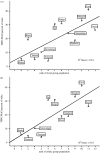More 'altruistic' punishment in larger societies
- PMID: 18089534
- PMCID: PMC2596817
- DOI: 10.1098/rspb.2007.1517
More 'altruistic' punishment in larger societies
Abstract
If individuals will cooperate with cooperators, and punish non-cooperators even at a cost to themselves, then this strong reciprocity could minimize the cheating that undermines cooperation. Based upon numerous economic experiments, some have proposed that human cooperation is explained by strong reciprocity and norm enforcement. Second-party punishment is when you punish someone who defected on you; third-party punishment is when you punish someone who defected on someone else. Third-party punishment is an effective way to enforce the norms of strong reciprocity and promote cooperation. Here we present new results that expand on a previous report from a large cross-cultural project. This project has already shown that there is considerable cross-cultural variation in punishment and cooperation. Here we test the hypothesis that population size (and complexity) predicts the level of third-party punishment. Our results show that people in larger, more complex societies engage in significantly more third-party punishment than people in small-scale societies.
Figures

References
-
- Bernhard H, Fischbacher U, Fehr E. Parochial altruism in humans. Nature. 2006;442:912–915. doi:10.1038/nature04981 - DOI - PubMed
-
- Boone J.L. Competition, conflict, and the development of social hierarchies. In: Smith E.A, Winterhalder B, editors. Evolutionary ecology and human behavior. Aldine de Gruyter; New York, NY: 1992. pp. 301–337.
-
- Boyd R, Richerson P.J. The evolution of reciprocity in sizeable groups. J. Theor. Biol. 1988;132:337–356. doi:10.1016/S0022-5193(88)80219-4 - DOI - PubMed
-
- Boyd R, Gintis H, Bowles S, Richerson P.J. The evolution of altruistic punishment. Proc. Natl Acad. Sci. USA. 2003;100:3531–3535. doi:10.1073/pnas.0630443100 - DOI - PMC - PubMed
-
- Ensminger, J. et al Submitted. Fairness and punishment in cross-cultural perspective
Publication types
MeSH terms
LinkOut - more resources
Full Text Sources

